Unit 13 We're trying to save the earth! Section A (1a~2d) 课件 (共38张PPT)
文档属性
| 名称 | Unit 13 We're trying to save the earth! Section A (1a~2d) 课件 (共38张PPT) | 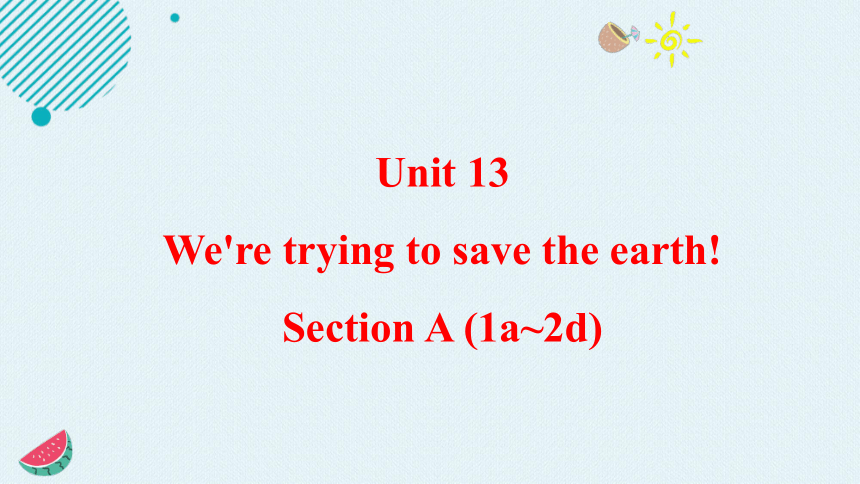 | |
| 格式 | pptx | ||
| 文件大小 | 10.5MB | ||
| 资源类型 | 教案 | ||
| 版本资源 | 人教新目标(Go for it)版 | ||
| 科目 | 英语 | ||
| 更新时间 | 2024-07-21 22:52:13 | ||
图片预览

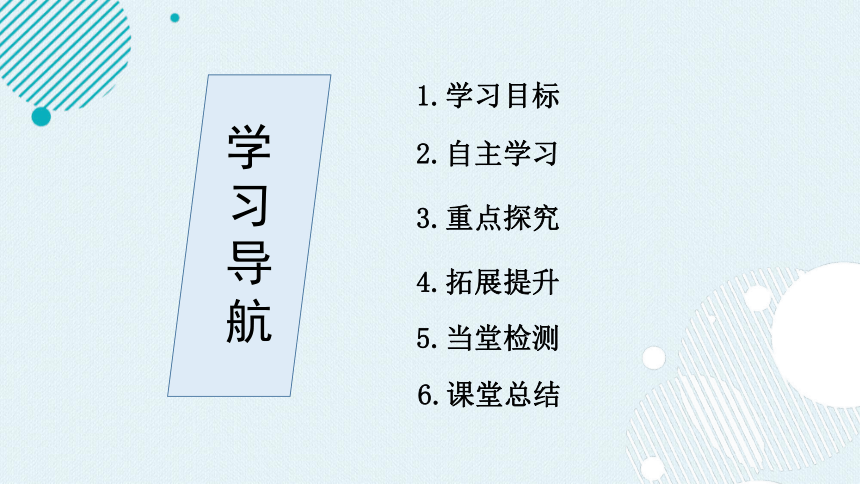
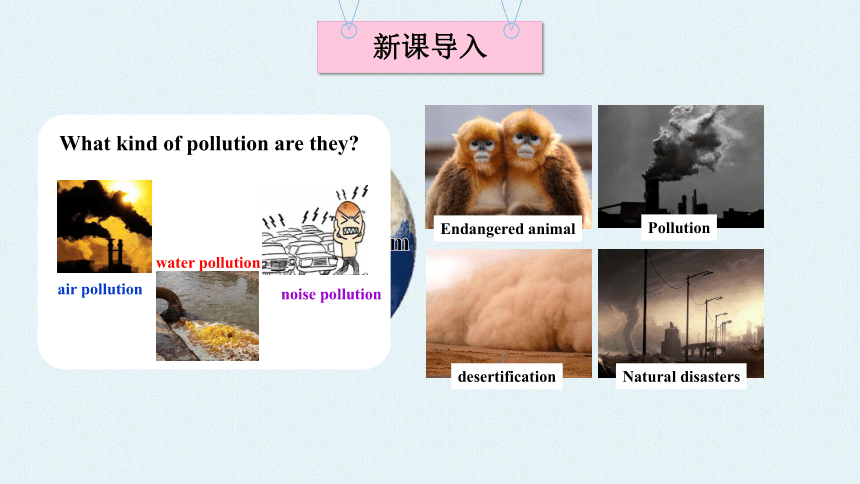
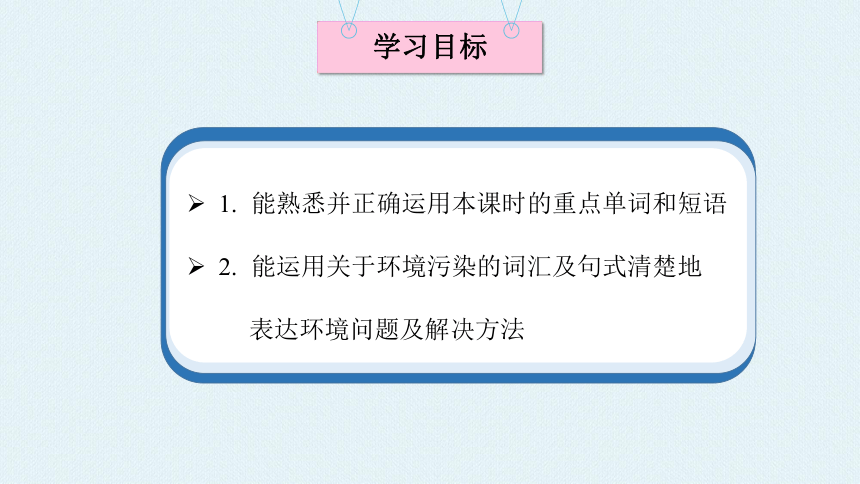
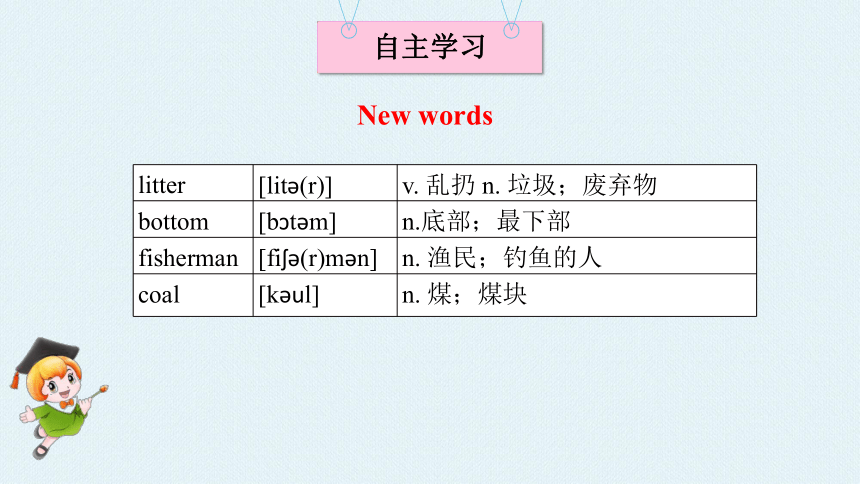
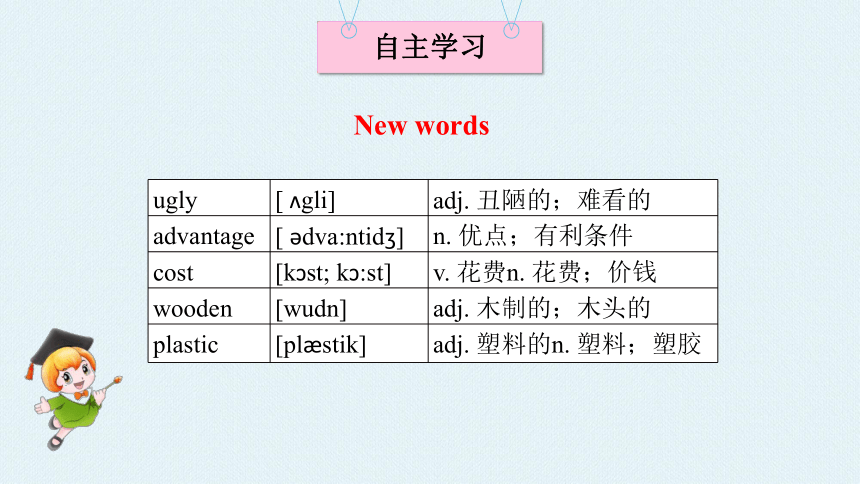
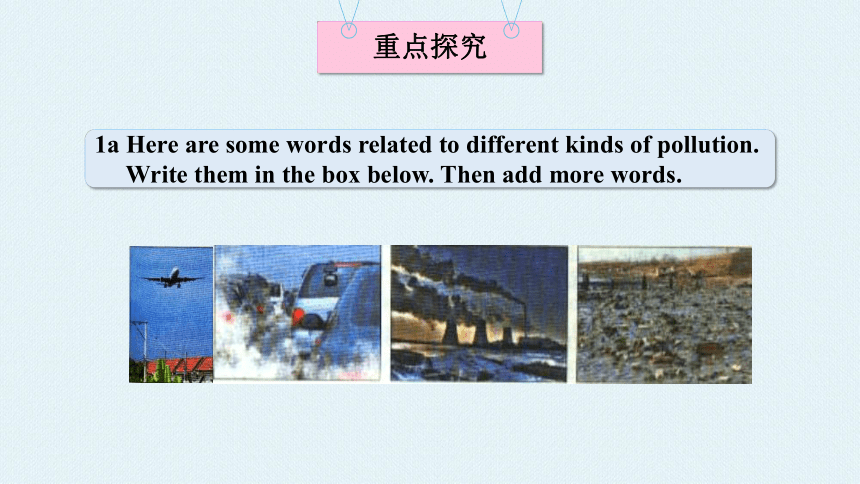
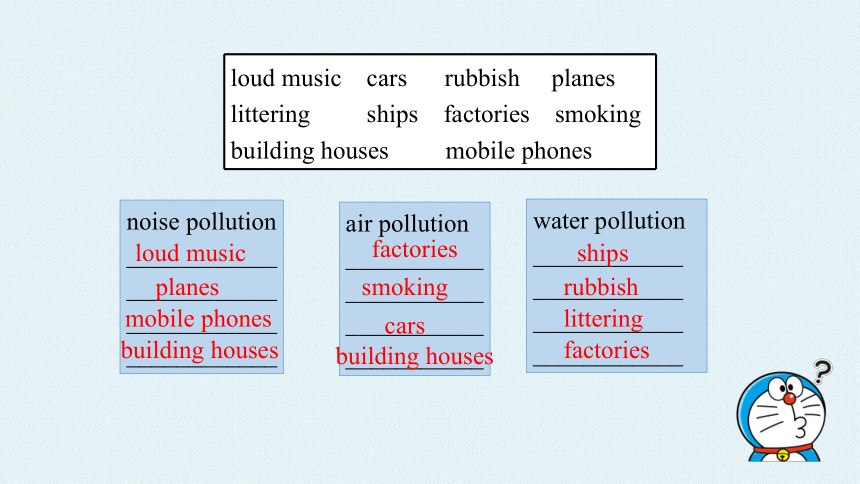


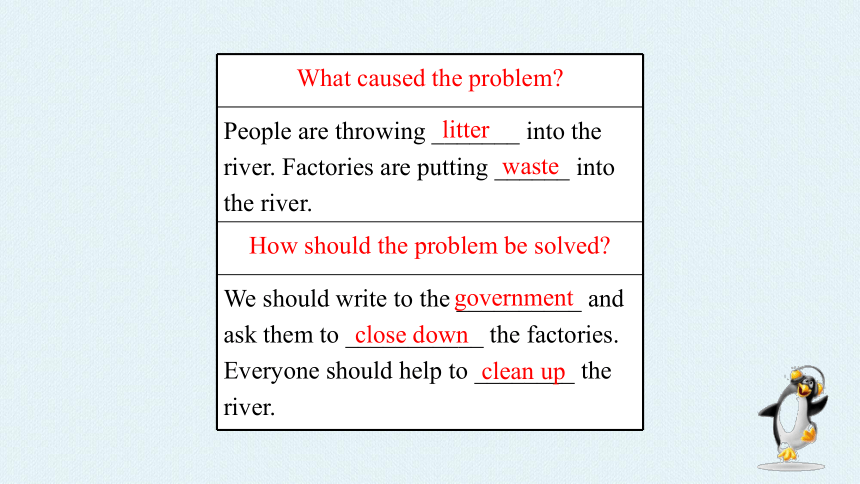
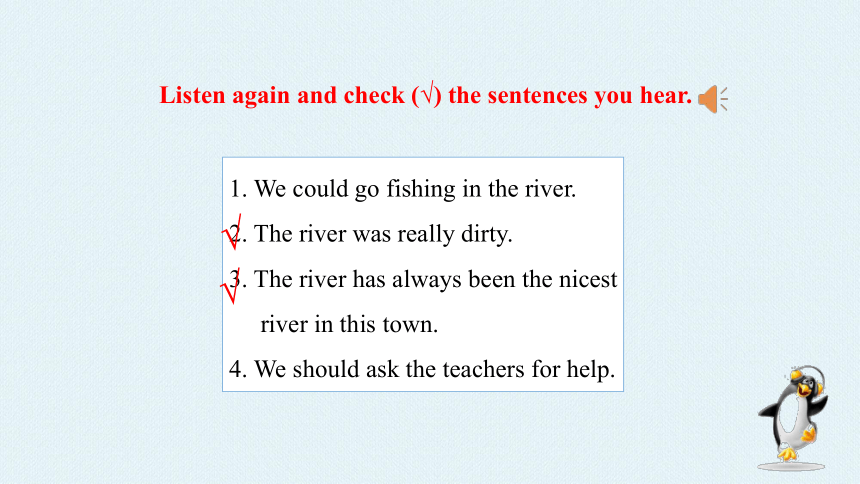
文档简介
(共38张PPT)
Unit 13
We're trying to save the earth!
Section A (1a~2d)
1.学习目标
3.重点探究
2.自主学习
学习导航
5.当堂检测
6.课堂总结
4.拓展提升
新课导入
The world’s problem
Endangered animal
Pollution
desertification
Natural disasters
What kind of pollution are they
air pollution
noise pollution
water pollution
学习目标
1. 能熟悉并正确运用本课时的重点单词和短语
2. 能运用关于环境污染的词汇及句式清楚地
表达环境问题及解决方法
自主学习
New words
litter [lit (r)] v. 乱扔 n. 垃圾;废弃物
bottom [b t m] n.底部;最下部
fisherman [fi (r)m n] n. 渔民;钓鱼的人
coal [k ul] n. 煤;煤块
自主学习
New words
ugly [ gli] adj. 丑陋的;难看的
advantage [ dva:ntid ] n. 优点;有利条件
cost [k st; k :st] v. 花费n. 花费;价钱
wooden [wudn] adj. 木制的;木头的
plastic [pl stik] adj. 塑料的n. 塑料;塑胶
重点探究
1a Here are some words related to different kinds of pollution.
Write them in the box below. Then add more words.
noise pollution
____________
____________
____________
____________
air pollution
___________
___________
___________
___________
water pollution
____________
____________
____________
____________
loud music
planes
mobile phones
factories
cars
smoking
ships
factories
littering
rubbish
building houses
building houses
loud music cars rubbish planes
littering ships factories smoking
building houses mobile phones
What does this picture talk about
Water pollution has become a serious problem.
“
”
1b Listen and complete the sentences.
What was the problem
The river was __________. Even the
bottom (底部) of the river was full of
_________. There were no more ______
for fishermen (渔民) to catch.
really dirty
rubbish
fish
What caused the problem
People are throwing _______ into the
river. Factories are putting ______ into
the river.
How should the problem be solved
We should write to the __________ and
ask them to ___________ the factories.
Everyone should help to ________ the
river.
litter
waste
government
close down
clean up
Listen again and check (√) the sentences you hear.
1. We could go fishing in the river.
2. The river was really dirty.
3. The river has always been the nicest
river in this town.
4. We should ask the teachers for help.
√
√
1c Role-play the conversation.
The river was dirty. Even the bottom of the river was full of rubbish.
But it used to be so clean!
Yes, but people are throwing litter into the river.
Everyone in this town should play a part in cleaning it up!
Role-play
Make conversations using the pollution in 1a.
...
...
Practice
What kind of pollution has been showed in this picture What do you think has caused this pollution
Air pollution.
The sky is grey and people are usually wearing masks when they are in the open air.
Causes: a huge number of automobiles and coal-burning…
Look and say
Land pollution
Causes: Industrial Pollution and all kinds of human activities…
What kind of pollution has been showed in this picture What do you think has caused this pollution
Look and say
Noise pollution
Causes: barking dogs, lawn mowers, power saws, motorcycles, airplanes, cars, people…
What kind of pollution has been showed in this picture What do you think has caused this pollution
Look and say
2a Listen to the interview. Circle the kinds of pollution
that Jason and Susan talk about.
land pollution B. air pollution
C. noise pollution D. water pollution
2b Listen again and complete the sentences.
The air is badly polluted because there are __________ on the road these days.
Factories that burn coal also _______ the air with a lot of black smoke.
There is also too much rubbish and waste. People ________________ things every day.
People are also littering in ____________ like parks. This is turning beautiful places into ugly ones.
more cars
pollute
are throwing away
public places
2c Use the information in 2a and 2b to role-play
conversations between Jason and Susan.
Pair work
The air has become really polluted around here. I’m getting very worried.
Yes, I used to be able to see stars in the sky.
The problem is that…
What should we do to save the earth
Discussion
1. Turn off the lights when you leave a room.
关掉
2. stop riding in cars
3. stop using paper towels or napkins(餐巾,餐巾纸)
4. recycle books and paper
回收利用
5. ...
Read 2d and complete the chart.
Problems Solving problems
air pollution
waste pollution
rubbish
take the bus, subway or ride a bike instead of driving
bring a bag to go shopping, never
take wooden chopsticks or plastic forks but use the ones at home while buying takeway food
throw rubbish in the bins
Jason and Susan, what are your ideas for
solving these problems
Role-play
拓展提升
Language points
1. We’re trying to save the earth!
我们正在竭尽全力拯救地球!
try to do sth.=try one’s best to do sth.
努力去做某事。
e.g. Every student should try to study hard in order
to study in a good university. 为了进入一所好
大学学习,每个学生都应该努力学习。
2. Here are some words related to different kinds of pollution.这里有一些与不同类型的污染有关的词。
be related to 与……有关
e.g. I am not related to him in any way.
我和他无任何关系。
3. Everyone in this town should play a part in cleaning it up!这个镇上的每个人都应该参与清理工作!
play a part in 在……方面起作用
e.g. A good diet plays a large part in helping people live
longer.健康的饮食在帮助人们长寿方面起着
非常大的作用。
4. Even the bottom of the river was full of rubbish.
Yes, but people are throwing litter into the river.
litter和rubbish都可指“垃圾”,用作不可数名词。
rubbish指“没用的东西(被扔或将要丢弃的无用的东西)”不可回收。
litter指“(室内或公共场所)乱扔的废物(纸屑、不要的包装纸、废瓶等)”还可回收。
e.g. Throw the rubbish out.
把垃圾扔出去。
The room is full of rubbish.
房间里堆满了垃圾。
Pick up your litter after a picnic.
野餐后将废弃物收拾好。
5. This is turning beautiful places into ugly ones.
这将美丽的地方变成丑陋的地方。
turn… into… 把……变成……
e.g. The icy rain seemed like to turn into snow.
冻雨似乎又变成雪花的模样。
6. It’s good for health and it doesn’t cost anything!
它有益于健康,而且不花任何费用!
cost v. 花费;使付出指花费金钱,主语通常是物。cost的过去式和过去分词均为cost。
e.g. The new shirt cost Mr. Wang 200 yuan.
王先生花了200元买了新衬衫。
How much does the new computer cost
新电脑花了多少钱?
【拓展】take, spend, pay & cost
1) take多表示花费时间,常用于It takes sb. some time to do sth.这一句型中,其中it作形式主语。
e.g. It usually takes me 40 minutes to cook the dinner.
2) spend多表示花费时间和金钱,主语通常是人,常用于sb. spend(s) some time / money on sth.和sb. spend(s) some time / money (in) doing sth.两种句型。
e.g. David spent 2,000 yuan on the new machine.
My father spends an hour (in) watching the news
on TV every day.
3) pay多表示花费金钱,主语通常是人,常用于sb. pay(s) some money for sth.句型。
e.g. Tommy paid 20 yuan for his breakfast yesterday.
4) cost多表示花费金钱,主语通常是物,常用于sth. cost(s) (sb.) some money句型。
e.g. The new dress cost Linda 88 yuan.
根据句意用take, spend, pay或cost的适当形式填空。
1. That new car ________ them lots of money.
2. Mona ________ 50 yuan on the books just now.
3. It usually _____me an hour to do my homework.
4. You should _______some time practicing your pronunciation.
5. My brother _____ 6, 000 yuan for the new computer yesterday.
cost
spent
takes
Exercise
spend
paid
7. So together, our actions can make a difference and lead to a better future!
make a difference (to…) (对……)产生影响或作用
e.g. Do you think his words would make
any difference to the final decision
你认为他的话会对最后的决定产生影响吗?
The new teacher always encourages little
Tom. This has made a big difference to him.
新来的老师总是鼓励小汤姆。这对他影响很大。
当堂检测
Ⅰ. 根据句意及所给首字母提示,补全句中所缺单词。
1. The new car c a lot of money, but it was certainly worth it.
2. There is a w bed, a table and two chairs in this small
room.
3. It is a very clean city. You will hardly find l when you
walk along the street.
4. My uncle is a great f and he caught four fish this
morning.
5. Living in this street has a lot of a . The only
drawback (弊端) is noise.
ost
ooden/ood
itter
isherman
dvantages
Ⅱ. 根据汉语意思完成英语句子,每空一词。
1. 牛奶对孩子们的健康有好处。
Milk ____ ______ ____ children's health.
2. 辛迪,请记得帮我寄信。
Cindy, please _________ ____ _____ me send the letter.
3. 我们没有茶。你愿意喝点咖啡代替茶吗?
We don't have any tea. Would you like coffee ______ ___ tea
4. 人们普遍认为,教育会对一个人的生活产生影响。
People generally agree that education can
_____ __ _________ __ a person's life.
is good for
remember to help
instead of
make a difference to
课堂总结
能运用关于环境污染的词汇及句式清楚地表达环境问题及解决方法
重要短语:
try to do sth.=try one’s best to do sth. 努力去做某事。
be related to 与……有关
play a part in 在……方面起作用
play a part 在……中扮演角色
turn… into… 把……变成……
make a difference (to…)
(对……)产生影响或作用
Unit 13
Section A (1a~2d)
Unit 13
We're trying to save the earth!
Section A (1a~2d)
1.学习目标
3.重点探究
2.自主学习
学习导航
5.当堂检测
6.课堂总结
4.拓展提升
新课导入
The world’s problem
Endangered animal
Pollution
desertification
Natural disasters
What kind of pollution are they
air pollution
noise pollution
water pollution
学习目标
1. 能熟悉并正确运用本课时的重点单词和短语
2. 能运用关于环境污染的词汇及句式清楚地
表达环境问题及解决方法
自主学习
New words
litter [lit (r)] v. 乱扔 n. 垃圾;废弃物
bottom [b t m] n.底部;最下部
fisherman [fi (r)m n] n. 渔民;钓鱼的人
coal [k ul] n. 煤;煤块
自主学习
New words
ugly [ gli] adj. 丑陋的;难看的
advantage [ dva:ntid ] n. 优点;有利条件
cost [k st; k :st] v. 花费n. 花费;价钱
wooden [wudn] adj. 木制的;木头的
plastic [pl stik] adj. 塑料的n. 塑料;塑胶
重点探究
1a Here are some words related to different kinds of pollution.
Write them in the box below. Then add more words.
noise pollution
____________
____________
____________
____________
air pollution
___________
___________
___________
___________
water pollution
____________
____________
____________
____________
loud music
planes
mobile phones
factories
cars
smoking
ships
factories
littering
rubbish
building houses
building houses
loud music cars rubbish planes
littering ships factories smoking
building houses mobile phones
What does this picture talk about
Water pollution has become a serious problem.
“
”
1b Listen and complete the sentences.
What was the problem
The river was __________. Even the
bottom (底部) of the river was full of
_________. There were no more ______
for fishermen (渔民) to catch.
really dirty
rubbish
fish
What caused the problem
People are throwing _______ into the
river. Factories are putting ______ into
the river.
How should the problem be solved
We should write to the __________ and
ask them to ___________ the factories.
Everyone should help to ________ the
river.
litter
waste
government
close down
clean up
Listen again and check (√) the sentences you hear.
1. We could go fishing in the river.
2. The river was really dirty.
3. The river has always been the nicest
river in this town.
4. We should ask the teachers for help.
√
√
1c Role-play the conversation.
The river was dirty. Even the bottom of the river was full of rubbish.
But it used to be so clean!
Yes, but people are throwing litter into the river.
Everyone in this town should play a part in cleaning it up!
Role-play
Make conversations using the pollution in 1a.
...
...
Practice
What kind of pollution has been showed in this picture What do you think has caused this pollution
Air pollution.
The sky is grey and people are usually wearing masks when they are in the open air.
Causes: a huge number of automobiles and coal-burning…
Look and say
Land pollution
Causes: Industrial Pollution and all kinds of human activities…
What kind of pollution has been showed in this picture What do you think has caused this pollution
Look and say
Noise pollution
Causes: barking dogs, lawn mowers, power saws, motorcycles, airplanes, cars, people…
What kind of pollution has been showed in this picture What do you think has caused this pollution
Look and say
2a Listen to the interview. Circle the kinds of pollution
that Jason and Susan talk about.
land pollution B. air pollution
C. noise pollution D. water pollution
2b Listen again and complete the sentences.
The air is badly polluted because there are __________ on the road these days.
Factories that burn coal also _______ the air with a lot of black smoke.
There is also too much rubbish and waste. People ________________ things every day.
People are also littering in ____________ like parks. This is turning beautiful places into ugly ones.
more cars
pollute
are throwing away
public places
2c Use the information in 2a and 2b to role-play
conversations between Jason and Susan.
Pair work
The air has become really polluted around here. I’m getting very worried.
Yes, I used to be able to see stars in the sky.
The problem is that…
What should we do to save the earth
Discussion
1. Turn off the lights when you leave a room.
关掉
2. stop riding in cars
3. stop using paper towels or napkins(餐巾,餐巾纸)
4. recycle books and paper
回收利用
5. ...
Read 2d and complete the chart.
Problems Solving problems
air pollution
waste pollution
rubbish
take the bus, subway or ride a bike instead of driving
bring a bag to go shopping, never
take wooden chopsticks or plastic forks but use the ones at home while buying takeway food
throw rubbish in the bins
Jason and Susan, what are your ideas for
solving these problems
Role-play
拓展提升
Language points
1. We’re trying to save the earth!
我们正在竭尽全力拯救地球!
try to do sth.=try one’s best to do sth.
努力去做某事。
e.g. Every student should try to study hard in order
to study in a good university. 为了进入一所好
大学学习,每个学生都应该努力学习。
2. Here are some words related to different kinds of pollution.这里有一些与不同类型的污染有关的词。
be related to 与……有关
e.g. I am not related to him in any way.
我和他无任何关系。
3. Everyone in this town should play a part in cleaning it up!这个镇上的每个人都应该参与清理工作!
play a part in 在……方面起作用
e.g. A good diet plays a large part in helping people live
longer.健康的饮食在帮助人们长寿方面起着
非常大的作用。
4. Even the bottom of the river was full of rubbish.
Yes, but people are throwing litter into the river.
litter和rubbish都可指“垃圾”,用作不可数名词。
rubbish指“没用的东西(被扔或将要丢弃的无用的东西)”不可回收。
litter指“(室内或公共场所)乱扔的废物(纸屑、不要的包装纸、废瓶等)”还可回收。
e.g. Throw the rubbish out.
把垃圾扔出去。
The room is full of rubbish.
房间里堆满了垃圾。
Pick up your litter after a picnic.
野餐后将废弃物收拾好。
5. This is turning beautiful places into ugly ones.
这将美丽的地方变成丑陋的地方。
turn… into… 把……变成……
e.g. The icy rain seemed like to turn into snow.
冻雨似乎又变成雪花的模样。
6. It’s good for health and it doesn’t cost anything!
它有益于健康,而且不花任何费用!
cost v. 花费;使付出指花费金钱,主语通常是物。cost的过去式和过去分词均为cost。
e.g. The new shirt cost Mr. Wang 200 yuan.
王先生花了200元买了新衬衫。
How much does the new computer cost
新电脑花了多少钱?
【拓展】take, spend, pay & cost
1) take多表示花费时间,常用于It takes sb. some time to do sth.这一句型中,其中it作形式主语。
e.g. It usually takes me 40 minutes to cook the dinner.
2) spend多表示花费时间和金钱,主语通常是人,常用于sb. spend(s) some time / money on sth.和sb. spend(s) some time / money (in) doing sth.两种句型。
e.g. David spent 2,000 yuan on the new machine.
My father spends an hour (in) watching the news
on TV every day.
3) pay多表示花费金钱,主语通常是人,常用于sb. pay(s) some money for sth.句型。
e.g. Tommy paid 20 yuan for his breakfast yesterday.
4) cost多表示花费金钱,主语通常是物,常用于sth. cost(s) (sb.) some money句型。
e.g. The new dress cost Linda 88 yuan.
根据句意用take, spend, pay或cost的适当形式填空。
1. That new car ________ them lots of money.
2. Mona ________ 50 yuan on the books just now.
3. It usually _____me an hour to do my homework.
4. You should _______some time practicing your pronunciation.
5. My brother _____ 6, 000 yuan for the new computer yesterday.
cost
spent
takes
Exercise
spend
paid
7. So together, our actions can make a difference and lead to a better future!
make a difference (to…) (对……)产生影响或作用
e.g. Do you think his words would make
any difference to the final decision
你认为他的话会对最后的决定产生影响吗?
The new teacher always encourages little
Tom. This has made a big difference to him.
新来的老师总是鼓励小汤姆。这对他影响很大。
当堂检测
Ⅰ. 根据句意及所给首字母提示,补全句中所缺单词。
1. The new car c a lot of money, but it was certainly worth it.
2. There is a w bed, a table and two chairs in this small
room.
3. It is a very clean city. You will hardly find l when you
walk along the street.
4. My uncle is a great f and he caught four fish this
morning.
5. Living in this street has a lot of a . The only
drawback (弊端) is noise.
ost
ooden/ood
itter
isherman
dvantages
Ⅱ. 根据汉语意思完成英语句子,每空一词。
1. 牛奶对孩子们的健康有好处。
Milk ____ ______ ____ children's health.
2. 辛迪,请记得帮我寄信。
Cindy, please _________ ____ _____ me send the letter.
3. 我们没有茶。你愿意喝点咖啡代替茶吗?
We don't have any tea. Would you like coffee ______ ___ tea
4. 人们普遍认为,教育会对一个人的生活产生影响。
People generally agree that education can
_____ __ _________ __ a person's life.
is good for
remember to help
instead of
make a difference to
课堂总结
能运用关于环境污染的词汇及句式清楚地表达环境问题及解决方法
重要短语:
try to do sth.=try one’s best to do sth. 努力去做某事。
be related to 与……有关
play a part in 在……方面起作用
play a part 在……中扮演角色
turn… into… 把……变成……
make a difference (to…)
(对……)产生影响或作用
Unit 13
Section A (1a~2d)
同课章节目录
- Unit 1 How can we become good learners.
- Section A
- Section B
- Unit 2 I think that mooncakes are delicious!
- Section A
- Section B
- Unit 3 Could you please tell me where the restroom
- Section A
- Section B
- Unit 4 I used to be afraid of the dark.
- Section A
- Section B
- Unit 5 What are the shirts made of?
- Section A
- Section B
- Review of Units 1-5
- Unit 6 When was it invented?
- Section A
- Section B
- Unit 7 Teenagers should be allowed to choose their
- Section A
- Section B
- Unit 8 It must belong to Carla.
- Section A
- Section B
- Unit 9 I like music that I can dance to.
- Section A
- Section B
- Unit 10 You're supposed to shake hands.
- Section A
- Section B
- Review of Units 6-10
- Unit 11 Sad movies make me cry.
- Section A
- Section B
- Unit 12 Life is full of the unexpected
- Section A
- Section B
- Unit 13 We're trying to save the earth!
- Section A
- Section B
- Unit 14 I remember meeting all of you in Grade 7.
- Section A
- Section B
- Review of Units 11-14
